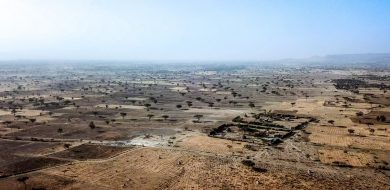Since 2017, together with IDH, we are working on the reforestation and restoration of degraded lands. Some background on this project:
In Ethiopia, trees are mainly used for logging and as fuel, which means the country is eroding. To help restore woodland cover and promote rainwater infiltration, over 950,000 seedlings were planted in the upper catchment of Lake Ziway over the past years. The trees were planted on the Worja hill, over an area measuring approximately 200 hectares. The area was designated by the local community itself. Grass that grows between the trees serves as animal feed. Some of the selected trees are fruit-bearing, and thus also serve as a source of food when the fruits are ripe. To supplement this reforestation work, 250 farmers were trained in constructing soil and water conservation structures, livestock feed production and other natural resource management skills. The project has over 350 beneficiaries. Together we have achieved many positive changes for the wider area.
In the 2022 we prolonged the project. With VOCDA as the local implementer, several initiatives have been added. One example is the development of eco-tourism activities because of its scenery and proximity to Lake Dembal and Batu town. The area is very suitable for wildlife viewing and migratory birds and easily accessible via the Batu-Butajera asphalt road that crosses the sites/mountain chains. Ecotourism has a dual purpose to protect the environment and generate additional income. Therefore, we trained 20 local community-members to run the newly constructed eco-tourism center. In cultural huts, visitors can now enjoy local drinks and food before walking the trails and enjoying the views.
Another example is the Income Generating Activity-groups where groups of local men and women are taught Business Development Skills. For instance, the Biftu Baha-group where 20 women have decided to produce and sell aloe vera and moringa soaps. Beekeeping is also stimulated. 50 modern beehives were handed over after a technical training was given to the beneficiaries. Soil and water conservation is now organized by the local community. To support them, we provided pickaxes and shovels.
In June, at the beginning of the rainy season, 1600 kg of improved maize seeds have been donated to local farmers to increase the yield of fodder production.
And another 50.000 seedlings were sown (Moringa, Leusiniya and Sesbania amongst others) at the nursery site in Adamitulu Jido Kombolcha Woreda with collaboration of the ATJK Woreda Agriculture and Natural resource office.
Lastly, bylaws are drafted, making sure that by the end of this project, the community can take full responsibility of all activities in a sustainable way.
